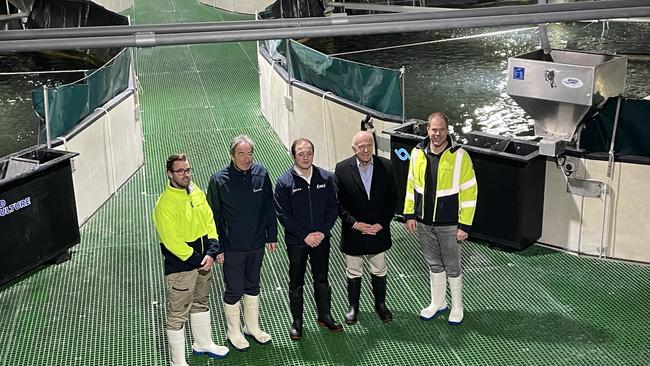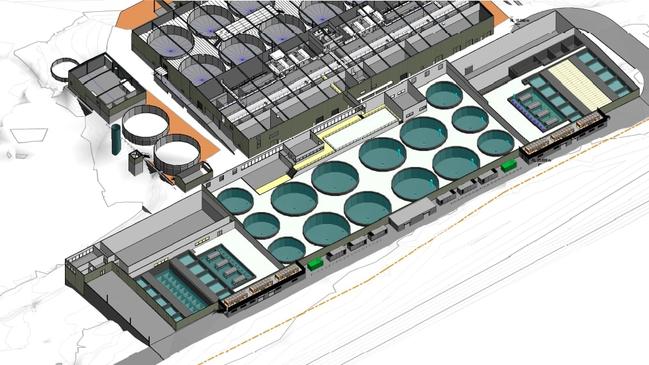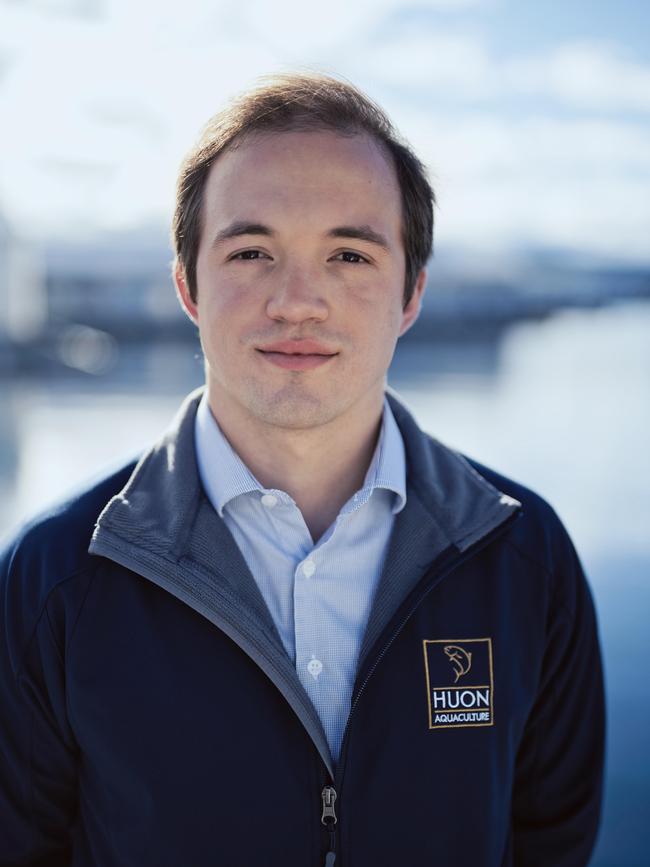New $110m nursery promises bigger fish on land
Huon Aquaculture claims its $110m investment will double its Port Huon Whale Point facility, but what does it entail? Watch the video to see inside >>
Tasmania
Don't miss out on the headlines from Tasmania. Followed categories will be added to My News.
Four-and-a-half Olympic-size swimming pools stocked with thousands of smolt salmon will form the centrepiece of Huon Aquaculture’s new $110m fish nursery.
The plans revealed on Thursday include expansion of the existing Recirculating Aquaculture System (RAS) at Huon’s Whale Point facility in Port Huon, making it one of the largest systems in the southern hemisphere.
The new build will include 14 holding tanks for maturing smolt, or juvenile salmon, with eight tanks holding a capacity of 1000 cubic metres and six tanks with a 500 cubic metre capacity.

Two water recycling systems at either end of the tanks will filter out waste, add oxygen, and circulate water back to the fish tanks.
Huon Aquaculture CEO Henry Batista said the extended facilities will allow salmon to grow another 2 months on land to a total of 14 months, almost 60 per cent of a salmon’s total life cycle.
“This reinforces Huon Aquaculture’s strategy to grow fish bigger on land, which will bring big, big benefits for us, feed efficiency, animal welfare throughout the animal’s life cycle and this is also a great sustainability outcome,” he said.
“It’s not only the biggest post-smolt RAS in the southern hemisphere, it is also with the highest degree of recirculation now at 99 per cent.”
The new RAS doubles Huon Aquaculture’s infrastructure at the Whale Point site, allowing for fish to grow larger without anymore expansion of the “marine footprint”.
Mr Batiste assured the facility will allow for fish to grow bigger on land, but did not say whether more fish will go through the facility.
“We have multiple facilities across Tasmania and we will grow our fish bigger than these facilities,” he said.
“That’s not necessarily more fish, but bigger fish.”

The new investment is not part of a move by Huon Aquaculture to move its farming entirely on land Mr Batiste confirmed, stating no “commercially viable” farm has moved all of its operations on land.
Demand for salmon has been going “continuously upwards” Mr Batiste said, sparking a need to invest more in Huon Aquaculture’s production facilities.
“There’s more demand for sustainable and healthy protein so demand is growing,” he said.
Minister for Business, Industry and Resources Eric Abetz hit back at criticism of the salmon industry, stating industry expansions where a clear sign people do “love salmon”.
“These expansion programs are based on one simple fact that people do love salmon and the demand for salmon is growing,” he said.
Opposition leader Dean Winter expressed his support for the investment, calling it a boost for regional communities in the Huon Valley who are “heavily reliant” on the aquaculture industry.
“What this means is that they can process more fish more effectively, employ more Tasmanians in a really good economic model for their business and also for Tasmania,” he said.
Construction for the new facility is planned for early 2025 to be fully operational by 2027.
Huon takes the plunge with mega cash splash on salmon
Initial: Salmon producer Huon Aquaculture will invest $110m to expand its operations in southern Tasmania in a major boost to the local economy.
The company, owned by JBS Foods Australia, will on Thursday reveal its plans for a major expansion of it its freshwater Atlantic salmon nursery at Whale Point, Port Huon.
Building a new Recirculating Aquaculture System will allow fish to grow longer on land, the company said — meaning they will go to sea larger and spend less time in the marine environment.
The project was described as a significant investment in regional Tasmania and is expected to generate 150 jobs during construction and eight permanent jobs once the facility is operational.
Huon led the use of RAS facilities in Tasmania with the opening of its first nursery at Whale Point in 2019.

Huon Aquaculture CEO Henry Batista said the investment would enable Huon to deploy cutting-edge technology.
“Huon salmon can already spend most of their life cycle on land and this expansion strengthens our land-based farming capabilities,” he said.
“This investment will also further improve water use at Whale Point, increasing the amount of water recycled in the RAS to 99 per cent.
“The remaining one per cent of water is used in our aquaculture operations and filtered waste from the facility is used by local farmers to grow produce like cherries.

“This investment allows us to utilise our existing land and offshore marine farming sites to meet growing demand for our premium Tasmanian salmon, while providing a significant boost for the construction industry and local businesses,” Mr Batista said.
Huon has about 140 employees across its nursery, net maintenance and marine operations based in Port Huon and is one of the biggest employers in the region.
Minister for Business, Industry and Resources, Eric Abetz welcomed Huon’s investment announcement.
“As part of our 2030 Strong Plan for Tasmania’s Future we are backing in industry to grow jobs and invest in projects around Tasmania,” he said.
“The expected benefits to the region from the construction and operational phases of this proposed world leading hatchery would be far-reaching, boosting regional employment, bolstering business confidence and giving the community certainty into the future.”
BC Electrical is among the local businesses set to work on the project.
Automation Engineer Ryan Flint said the new RAS facility would generate ongoing work for his company.
“During the construction phase of this project, we’re predicting that we will need to employ an additional five to ten staff members.
“Beyond the construction phase, the new facility will create additional ongoing work for our business particularly in maintenance work, once the new nursery is operational,“ Mr Flint said.
“Like many Huon Valley businesses, we see this $110 million dollar investment in the region as a massive boost to the local economy.”
Subject to regulatory approvals, construction of the new facility will begin in early 2025 and it will be operational in 2027.
Huon grew from one pen of fish in 1986, into one of Australia’s leading aquaculture businesses. It became part of JBS Foods Australia in 2021.
Originally published as New $110m nursery promises bigger fish on land


